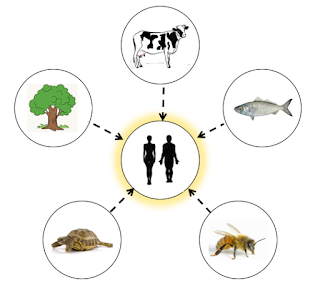Mathematical stories-we-live-by: the capitalist utopia within neoclassical economics' algebra
By Rodrigo Cáceres, economist and M.A in environmental ethics
In recent years, ecolinguistic research has produced very detailed analyses of the linguistic features of neoclassical economic theory and its implicit beliefs, which have been shown to ultimately lead to malign and destructive consequences for humans and for nature. From these I will now mention a few:
Firstly, the belief or assumption that human beings are purely self-interested beings that can only achieve well-being through purchase of material products, belief which encourages distrust between people and destruction of caring relationships among people, which in turn eliminates a sense of community belonging and encourages a sense of alienation.
Secondly, the belief or assumption that the environment is a storehouse of resources that exists only to satisfy the desires of human beings, which in linguistic terms implies a full depersonalization of nature: nature is no longer trees, mushrooms, birds, frogs, rainforests in all their singularity and beauty, but they are rather reduced to a kind of sack of uni-formity: no more birds, mushrooms or trees, only what the theory understand as natural resources. And then everything that is around humans can be turned into a commodity: even life on Earth as a whole (called biodiversity) can be considered a resource that exists for humans' benefit, and then transformed and sold for money.
Thirdly, is the belief that the neoclassical framework is somehow describing something objective that is valid in all contexts, a timeless reality. The basis for this belief is that economic theory is taught as a full-blown mathematical construct. One cannot argue against algebra, right?
If we think about it, the idea that the universe is governed by mathematical equations is something quite normally accepted within physics, especially after Isaac Newton's Principia. In other words, the belief that the universe is governed by equations became something rather common because of the evidence provided with the developments in Physics. In this sense, neoclassical theory profits from this type of belief by generating a mathematical construct that is supposed to reflect the general laws that govern human behavior.
In other words, economists have put mathematics as their greatest ally, and since they implicitly believe that these equations reflect something objective, these mathematical models become the supreme signs that govern their thought processes and ultimately policy advice and decisions.
In the detail of this mathematical construct, we find a series of postulates, among them that humans want something called "utility" and that this "utility" can only be achieved through purchase of products, which has its basis in a "theory of preferences" that portrays the manner in which humans prefer different types of material products, assuming that they always want to consume more of them. In reality, this is a theory of desire (the emotion), that states that in order for the economy to function, individuals must be constantly desiring new and more diverse products to buy.
The main point is that one of the fundamental stories-we-live-by, which is the main cause of the multiplicity of current ecological crises and leading to human self-destruction, is actually a math-based story, it has the blessing of mathematics and it is through this mathematical canon that it is taught in virtually all universities around the globe.
References
Stibbe, A. (2015). Ecolinguistics: Language, ecology and the stories we live by. Routledge.
Caceres, R. (2019). La teoría económica moderna y la destrucción de la naturaleza. Link here





Comments
Post a Comment